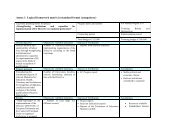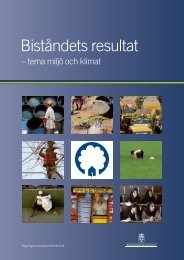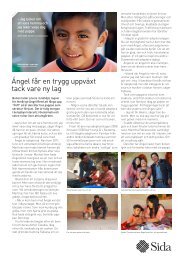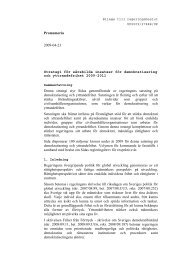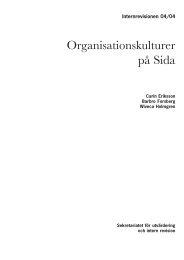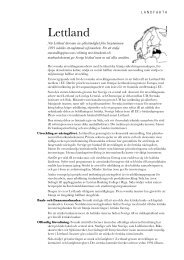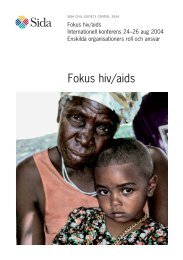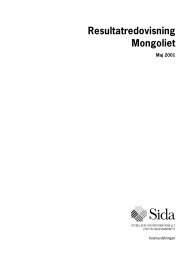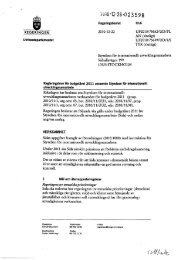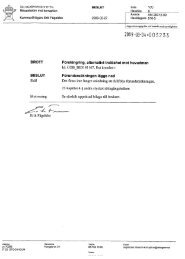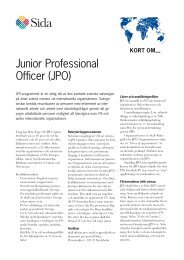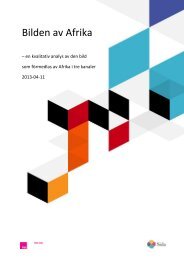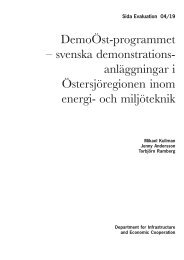Mid-Term Review of the AGIR Programme - Sida
Mid-Term Review of the AGIR Programme - Sida
Mid-Term Review of the AGIR Programme - Sida
Create successful ePaper yourself
Turn your PDF publications into a flip-book with our unique Google optimized e-Paper software.
A N N E X 3 – I N C E P T I O N R E P O R T<br />
“strategic direction <strong>of</strong> <strong>the</strong> organisation” and to support and facilitate linkages and<br />
knowledge sharing between CSOs. 46<br />
The total funding available for <strong>the</strong> <strong>AGIR</strong> programme is 405,200.00 SEK over a five<br />
(5) year period. Emerging out <strong>of</strong> <strong>the</strong> dialogue surrounding <strong>the</strong> production <strong>of</strong> <strong>the</strong> document<br />
“Guidelines : The Swedish Embassy’s Support to Mozambican Civil Society<br />
Organisations” (2009), three INGOs were initially identified as having ongoing programmes<br />
in <strong>the</strong> <strong>the</strong>matic areas that coincided with <strong>the</strong> Embassy’s cooperation strategy.<br />
Each <strong>of</strong> <strong>the</strong>se three ‘intermediary’ INGOs – Oxfam Novib, IBIS and Diakonia –<br />
were approached in mid - 2009 (a fourth INGO SCC was added in 2011) 47 and encouraged<br />
to submit proposals in line with <strong>the</strong> “support modalities outlined in <strong>the</strong><br />
guidelines” and falling within <strong>the</strong> <strong>the</strong>matic focus areas or “clusters”.<br />
While each <strong>of</strong> <strong>the</strong> intermediary organisations work in different <strong>the</strong>matic areas, <strong>the</strong>re<br />
are “strong joint features”. While considered as ‘sub-components’ within <strong>the</strong> larger<br />
<strong>AGIR</strong> programme <strong>the</strong> commonalities shared by <strong>the</strong> intermediaries include “(i) <strong>the</strong><br />
establishment <strong>of</strong> a division <strong>of</strong> labour between <strong>the</strong> three organisations, between and<br />
within <strong>the</strong> <strong>the</strong>matic “clusters”; (ii) <strong>the</strong> development <strong>of</strong> a joint program results framework<br />
as well as definition <strong>of</strong> joint capacity development activities; (iii) a joint MOU<br />
that regulates <strong>the</strong> interaction between <strong>the</strong> three partners; and (iv) definitions on how<br />
to coordinate work around <strong>the</strong> Paris agenda and to streng<strong>the</strong>n linkages between each<br />
o<strong>the</strong>rs’ CSO partners.” 48<br />
The funding for <strong>the</strong> <strong>AGIR</strong> programme is structured through different agreements with<br />
IBIS, Oxfam Novib, Diakonia and SCC, each implementing <strong>the</strong> following ‘subprograms:<br />
Access to information – IBIS<br />
Financial accountability; participation, social and legal accountability with focus<br />
on underlying causes <strong>of</strong> discrimination – Oxfam Novib<br />
Political accountability; participation, social and legal accountability with focus<br />
on <strong>the</strong> legal aspects <strong>of</strong> human rights – Diakonia<br />
Social accountability in natural resource management – SCC<br />
46 Streng<strong>the</strong>ning Civil Society – Enhancing Democratic Governance, p.5, 2010. <strong>Sida</strong>.<br />
47 The Swedish Cooperative Center (SCC) started up in 2011, one year later than <strong>the</strong> three original<br />
intermediaries. The initial agreement was with <strong>the</strong> intermediaries <strong>of</strong> Diakonia, IBIS, Oxfam. (SCC was<br />
not in mentioned in <strong>the</strong> initial programme proposals, but <strong>the</strong> area within which SCC works was mentioned<br />
as an area that was to be added – Social Accountability in Natural Resource Management).<br />
According to SCC, <strong>the</strong>ir late entry into <strong>the</strong> programme has to do with <strong>the</strong> fact that an important criteria<br />
for <strong>AGIR</strong> partners is that <strong>the</strong>ir programme and partners should have a national perspective, whereas<br />
SCC has primarily worked in a local perspective with local partners. O<strong>the</strong>r intermediary organisations<br />
have also challenged <strong>Sida</strong>’s centralised perspective, which according to <strong>the</strong> intermediary organisations<br />
has led to an opening for local dimensions in <strong>the</strong> programme.<br />
48 Streng<strong>the</strong>ning Civil Society – Enhancing Democratic Governance, p.5, 2010. <strong>Sida</strong>.<br />
90



